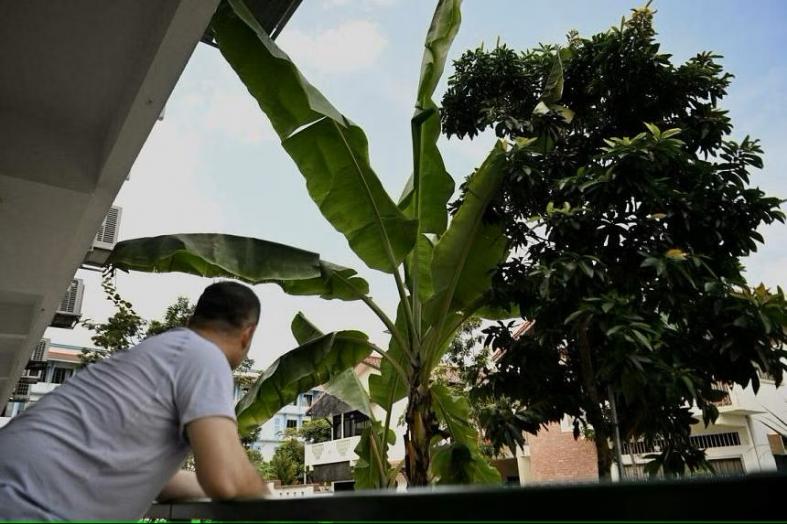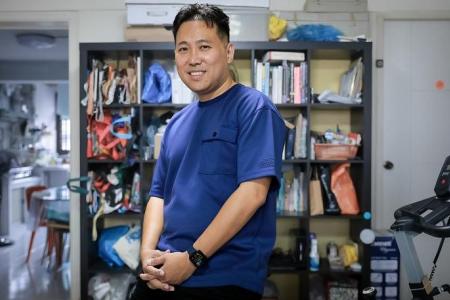Salvation Army initiatives allow prisoners to play with their kids, join support groups
He did not see his young daughter for three years after he was arrested in 2014 and later jailed over vice offences, as his estranged wife did not want to take the girl to visit him in prison.
It was through The Salvation Army’s Kids In Play initiative that the ex-offender, who wanted to be known only as Notle, 46, was able to see his daughter twice a year from 2017 to 2020, before the Covid-19 pandemic halted visits.
Kids In Play gives offenders a rare chance to bond with their children through video calls and in-person visits, where social workers organise activities and games. It supports children aged five to 18 with parents behind bars, as well as the inmates’ family members.
Notle had learnt from other inmates about the little-known initiative, which was launched in 2000, and got in touch with The Salvation Army through a prison officer.
Eventually, Notle’s mother took his daughter to see him, with the agreement of his wife, who had cut off all ties with him after he was arrested.
The girl was just six when Notle was remanded in 2014. He was sentenced to nine years’ jail in 2016, and it was only a year later that he saw his daughter again.
“I couldn’t wait to hug her, and I was anxiously waiting for her to show up,” recalled Notle, now a licensed tour guide and private-hire car driver. “But when she arrived, I almost couldn’t recognise her as she had grown up so much.”
He added: “At first, she was a bit shy and we just sat next to each other. After playing some icebreaker games, she started to warm up to me and even hugged me.”
Ms Audrie Siew, executive director of The Salvation Army’s children and youth group, said social workers and counsellors work with families to “help strengthen familial bonds and reunify families through reintegrating incarcerated parents into their families”.
There are similar initiatives run by other organisations, such as the Singapore Children’s Society and New Life Stories.
Under the Salvation Army initiative, there are also support groups for the inmates’ children and their caregivers, and counselling to help the kids make sense of their parents’ imprisonment, Ms Siew added.
Kids In Play also works with Prison Support Services, a unit under The Salvation Army, to support ex-offenders and their families for between six months and a year after their release – or longer, if needed.
Under Kids In Play, Notle and his daughter, now 15, received counselling and other help for about 1½ years after his release. When he was released on remission after serving two-thirds of his sentence in 2021, he realised his daughter bore some resentment towards him.
“The sessions helped me understand what my daughter was going through and what she was thinking,” Notle said, adding that their relationship has since improved and they are now able to go on outings.
The Salvation Army has helped more than 680 inmates under Kids In Play. It has also supported more than 630 of their families and over 1,200 children.
It also ran a Fathers’ Support Group over 12 sessions for inmates to learn parenting skills and ways to bond with their children. A pilot run ended in September, and the next run could take place in 2024, if approved by the Singapore Prison Service.
These inmates enjoyed privileges such as additional phone calls to their children every quarter and on their children’s birthdays. At the end of the programme, a bonding session let them engage in activities with their children.
Minister of State for Home Affairs Muhammad Faishal Ibrahim said last Monday that reoffending rates in Singapore have fallen to 20 per cent, down from 40 per cent two decades ago, thanks to various measures in the prisons and the community.
Some 28 per cent of the Singapore Prison Service’s inmate population are now on community-based programmes, compared with 11 per cent in 2014, he said.
He was speaking at the inaugural run of an international correctional leadership programme, attended by correctional leaders from countries including Hong Kong, Indonesia and Japan.
Associate Professor Faishal added: “More inmates are being released into the community under supervision towards the tail end of their sentences to facilitate their reintegration into society.”
Under the Home Detention Scheme, Ryan (not his real name) was able to serve the tail end of his sentence at home in 2022. He had to wear an ankle monitor, which was removed in September when he was released on good behaviour after serving two-thirds of his sentence.
Ryan is another ex-offender who, with the help of Kids In Play, was able to bond with his daughter, 10, and son, six. He was jailed for eight years in 2018 for cheating.

“I know I missed a lot of special moments that I’ll never get back, such as my daughter’s Primary 6 graduation,” said the 57-year-old.
“But I’m glad I got to touch and hold hands with my children twice a year. In fact, the face-to-face sessions allowed our bond to strengthen.”
He said the visits and counselling under Kids In Play helped them cope with his imprisonment.
“The sessions made me realise how much I’d done wrong in the past, what I missed out on, and what I should make up for when I’m out.”
Ryan and Notle are also part of The Salvation Army’s Overcomers’ Support Group launched in February, where ex-offenders learn coping skills from one another.
Between 10 and 15 ex-offenders attend each weekly session.
Ryan, now a manager at a logistics firm, said he found meaning in sharing his experience with other ex-offenders, while Notle said he enjoyed activities that the support group organises, such as art sessions and hiking.
Prison Support Services centre manager Jason Wong said the group aims to foster a positive environment that encourages ex-offenders to move away from people who exert a bad influence on them by forming new, positive relationships.
Said Ryan: “I can’t say I’m a totally changed person, as there are some old temptations that I’m trying to refrain from. But I’m trying to improve every day.”
Get The New Paper on your phone with the free TNP app. Download from the Apple App Store or Google Play Store now

